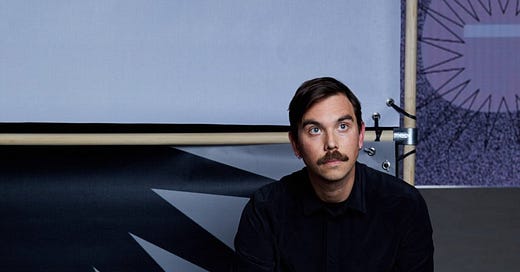James Bridle is a writer, artist and technologist. They are the author of 'New Dark Age' (2018) and the brand new 'Ways of Being' (2022). Iridescently original, deeply disorientating and yet somehow radically hopeful’ – Brian Eno
Tell us about yourself.
My name is James Bridle, and I’m a writer and artist. For the last decade or so, my work has explored the social and cultural implications of new technologies, and particularly the internet, covering such areas as artificial intelligence, social media, military drones, the history of networks, and the ways they impact our everyday lives. A few years ago, I wrote a book called ‘New Dark Age’, which was a kind of summation of these ideas – and which was a pretty tough read, as I’d come to see the impact of the internet on society and the planet, and the ways it has been commandeered by large tech companies, as pretty bleak!
In the last couple of years, I’ve been consciously reframing my practice around questions of the environment, ecology, and climate change, as the most significant (and interesting) challenge facing us today. Through artworks and writing, I’ve tried to figure out what is useful in what I know about – technology, the internet, AI – to bring to discussions of the environment. One outcome of this is a new book, ‘Ways of Being’ (FSG, available in the US in July).
The book starts with the realisation - inherited from ‘New Dark Age’ - that our technologies are really not helping us, and need urgent re-imagination. From there I wander through AI, non-human intelligence, the amazing worlds of plants, fungi, and micro-organisms, have a crack at felling the tree of evolution, play with some non-binary computers, investigate true randomness, and consider what a truly more-than-human politics of solidarity would actually consist of. It was a blast to write and I hope people will enjoy reading it.
Describe your media diet.
I live on a small island in a country I didn’t grow up in, so my diet is mostly remote – as a Brit, I keep up with news mostly through English-language sources like the Guardian, BBC, as well as the New York Times (and the thing I spent longest with every day is the NYT’s crossword app). There are also some Greek sources of local news – online editions in English, as well as the invaluable https://www.keeptalkinggreece.com and the ground-breaking, critical https://athenslive.gr.
I follow a bunch of blogs, which are mostly those of old friends these days, and subscribe to far too many newsletters – the only ones of which I always make sure to read are The Prepared and anything Craig Mod sends out (https://craigmod.com/newsletters/), and am a member of of a few private discussion groups - http://infrastructureclub.co.uk being the busiest and most consistently generative.
Finally, there are the slower subscriptions – I get the New Yorker - mostly so I can imagine what it must be like to still go to New York restaurants, Salvage Magazine, and Dark Mountain, in occasional but nourishing parcels of brain-food. I’m also a member of the Verso Book Club, an incredible deal for amazing e-books.
What’s the last great book you read?
I just finished ‘Mission Box’ by Aris Alexandrou, which reminded me that truly great novels exist, and are worth seeking out. It’s something of a classic of twentieth century Greek literature, dealing with the Civil War and the incredible strain it placed society and individuals under, which are still very much felt today, as well as going deep into questions of political and personal responsibility and idealism. It made me hungry for more books of such scope and artistry.
What are you reading now?
Several things, as usual. I’m deep in David Graeber and David Wengrow’s ‘The Dawn of Everything’, an incredible history of human society which draws our attention to the many, many examples of egalitarian and co-operative communities which modern archeology and anthropology are still in the process of uncovering, and which run counter to so much of the accepted story of our species. I’m studying and learning from Arturo Escobar’s ‘Designs for the Pluriverse’, which ties a new imagining of design theory and practice to decolonial and situated experiences, emphasising our mutual dependence on the earth systems and beings which surround us. And I am cackling over, and also learning from, Huw Lemmey and Ben Miller’s wonderful ‘Bad Gays’ (based on their excellent podcast of the same name), which manages to weave delicious and often excruciating tales from queer history with contemporary analysis and critique. Each of them is a joy.
What’s your reading strategy when you pick up a print copy of your favorite publication?
Flip through and read the shortest things first, and then soak in the longer pieces as time and inclination allows. Everything sits in a huge pile and gets returned to over and over until it is in tatters and has to be turned into compost.
Who should everyone be reading that they’re not?
I don’t know who isn’t, but everyone should be following Claire L. Evans (@theuniverse on Twitter) and reading everything she writes, starting with her book ‘Broad Band’, which retells the history of the web in expansive and radically important ways, and continuing with her reportage on artificial life, science fiction, new ecologies, and much else.
What is the best non-famous app you love on your phone?
My favourite apps are probably Flightradar24 and MarineTraffic, which allow me to identify and geek out over any vessel passing overhead or out to sea, but as they are already quite well known I would give a shout-out to ISS Detector, which does a similar thing for visible satellites. If you don’t know the pleasure of looking out at dusk to see a shooting star crewed by actual humans skip across the edge of the horizon, I highly recommend trying it out.
Plane or train?
Always the train. Unfortunately, I live in a place with very few of them, but have been known to go hours out of my route to experience a good sleeper carriage (the cabins on the Lakeshore Limited!) or that vanishing joy, the train-on-a-boat (formerly an option from Sweden to Germany, and much missed).
What is one place everyone should visit?
There are so many, but a couple of years ago I was lucky enough to visit a few of the world’s most significant urban sites in Southern Turkey, which date back as much as 20,000 years. Çatalhöyük, near Konya, and Göbekli Tepe, close to the Syrian border, are extraordinarily vivid windows into the deep past, across an almost unimaginable gulf of years, yet somehow alive and part of our common, shared history. (The Şanlıurfa Museum, close to Göbekli Tepe and filled with wondrous artefacts, should also be part of the journey.)
Tell us the story of a rabbit hole you fell deep into.
A few years ago I read a couple of articles online about strange videos on Kid’s YouTube, which led me down a really awful rabbit hole into the most distressing sub-sub-vaults of internet culture, automated content production, algorithmic moderation, and human abuse. I got a viral essay, a chunk of ‘New Dark Age’, and a 5-million-views TED Talk (linked below -ed)
out of it, and all my subsequent work might be considered, from one narrow angle, as a desperate attempt never to be the ‘Weird YouTube Guy’ ever again. (JB)
—
WITI x McKinsey:
An ongoing partnership where we highlight interesting McKinsey research, writing, and data.
On inflation, world trade, and unemployment in China. McKinsey’s Global Economics Intelligence explores rising food and energy prices, slow GDP growth and growing unemployment in China, a slowdown in world trade, an increase in interest rates, and more. Don’t miss the analysis.
—
Thanks for reading,
Noah (NRB) & Colin (CJN) & James (JB)
—
Why is this interesting? is a daily email from Noah Brier & Colin Nagy (and friends!) about interesting things. If you’ve enjoyed this edition, please consider forwarding it to a friend. If you’re reading it for the first time, consider subscribing (it’s free!).






He is new to me, and so are almost all of the sources he mentions/recommends. One exception: The Dawn of Everything, which I bought as soon as it was available. So refreshing! Marvelous debunking of so much historitrash! (Just made that up - feel free to use!) I’m looking forward to reading so many of the pieces/books mentioned. Thank you!